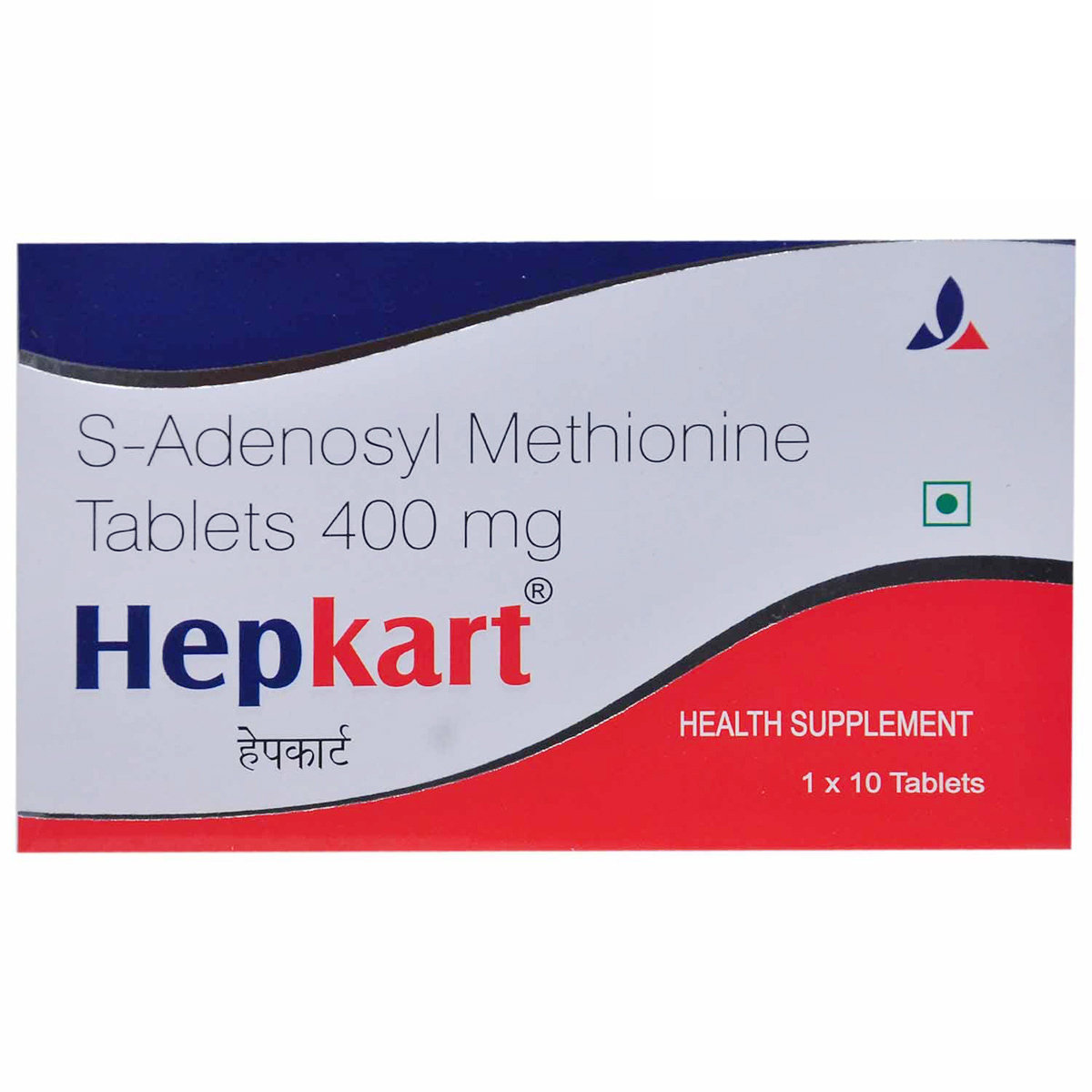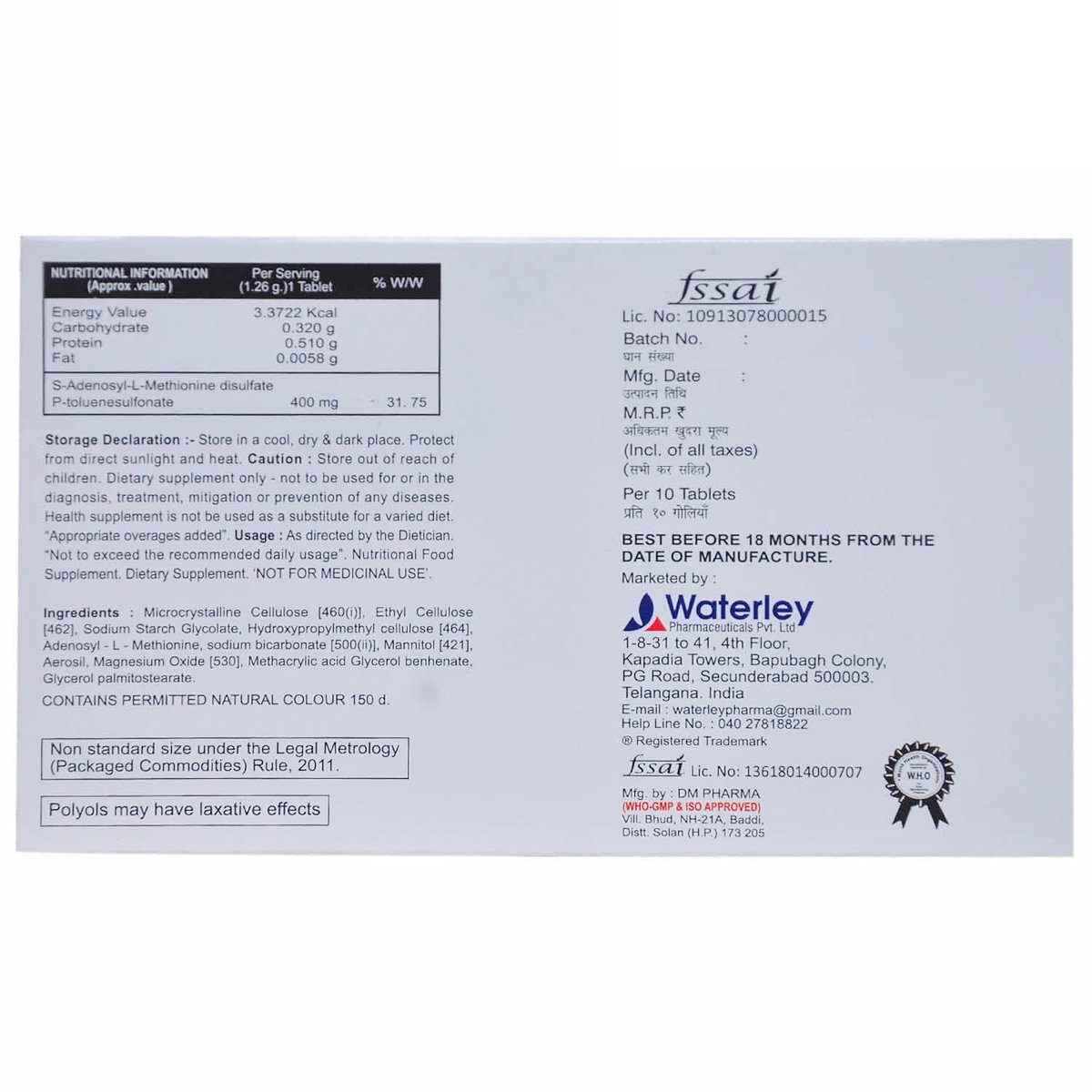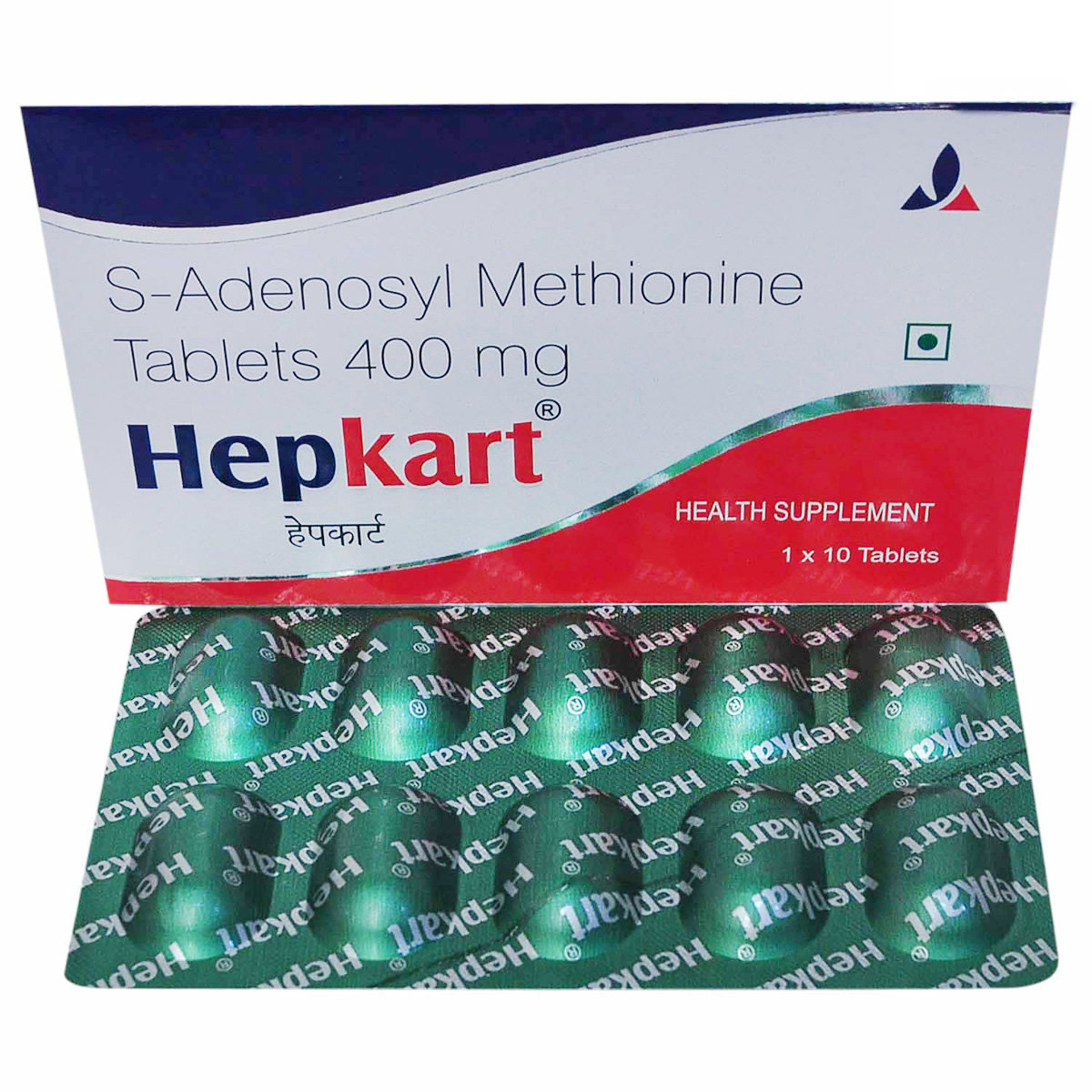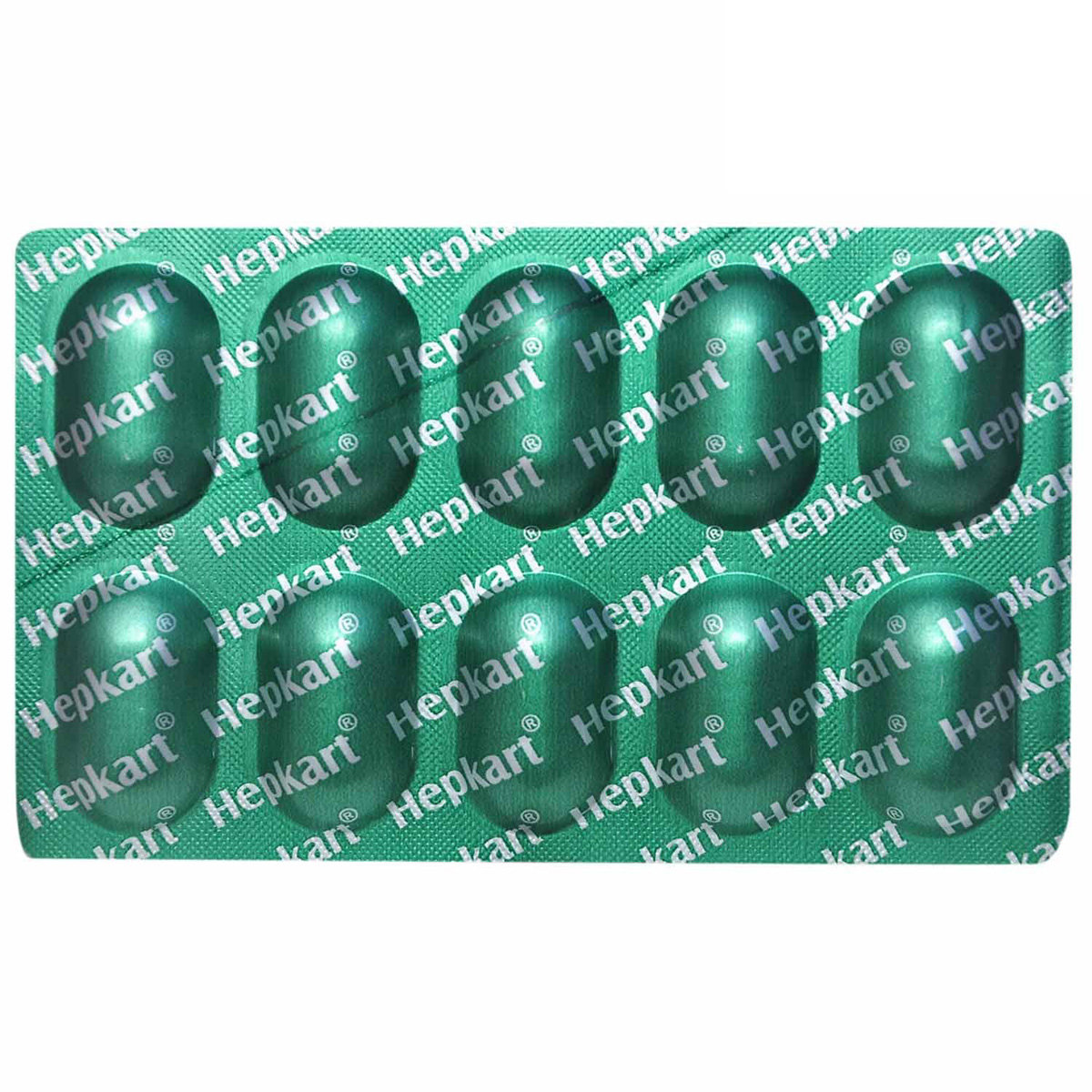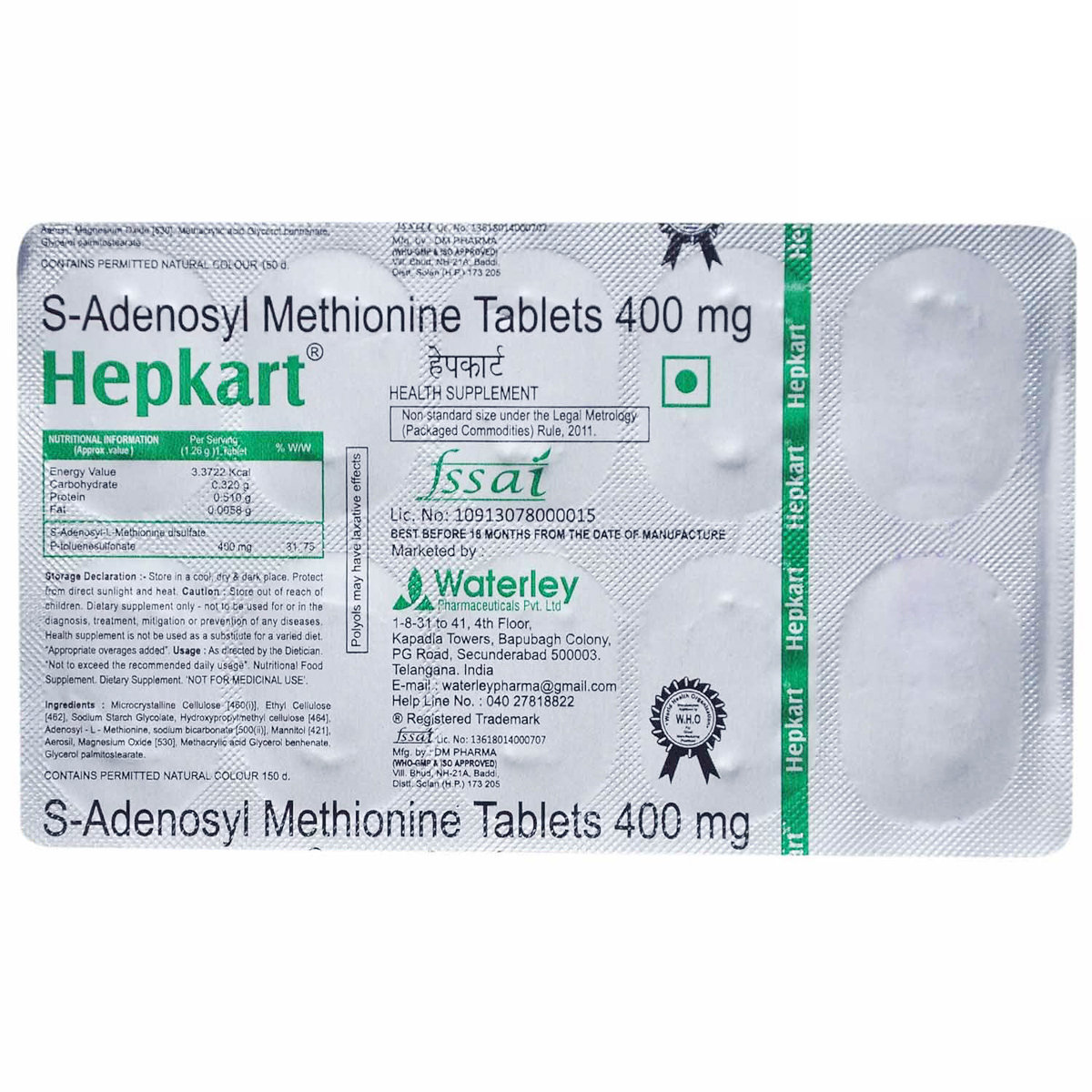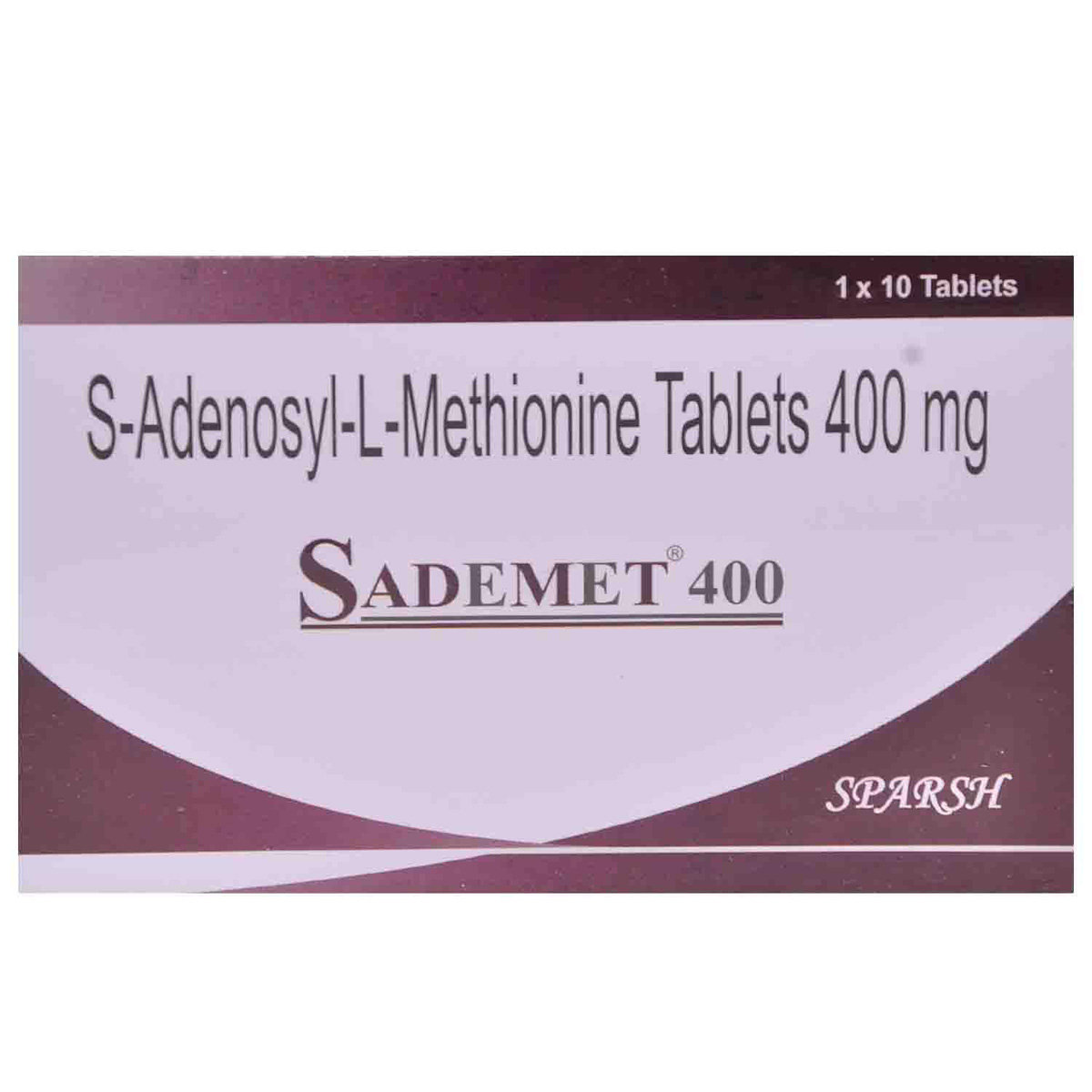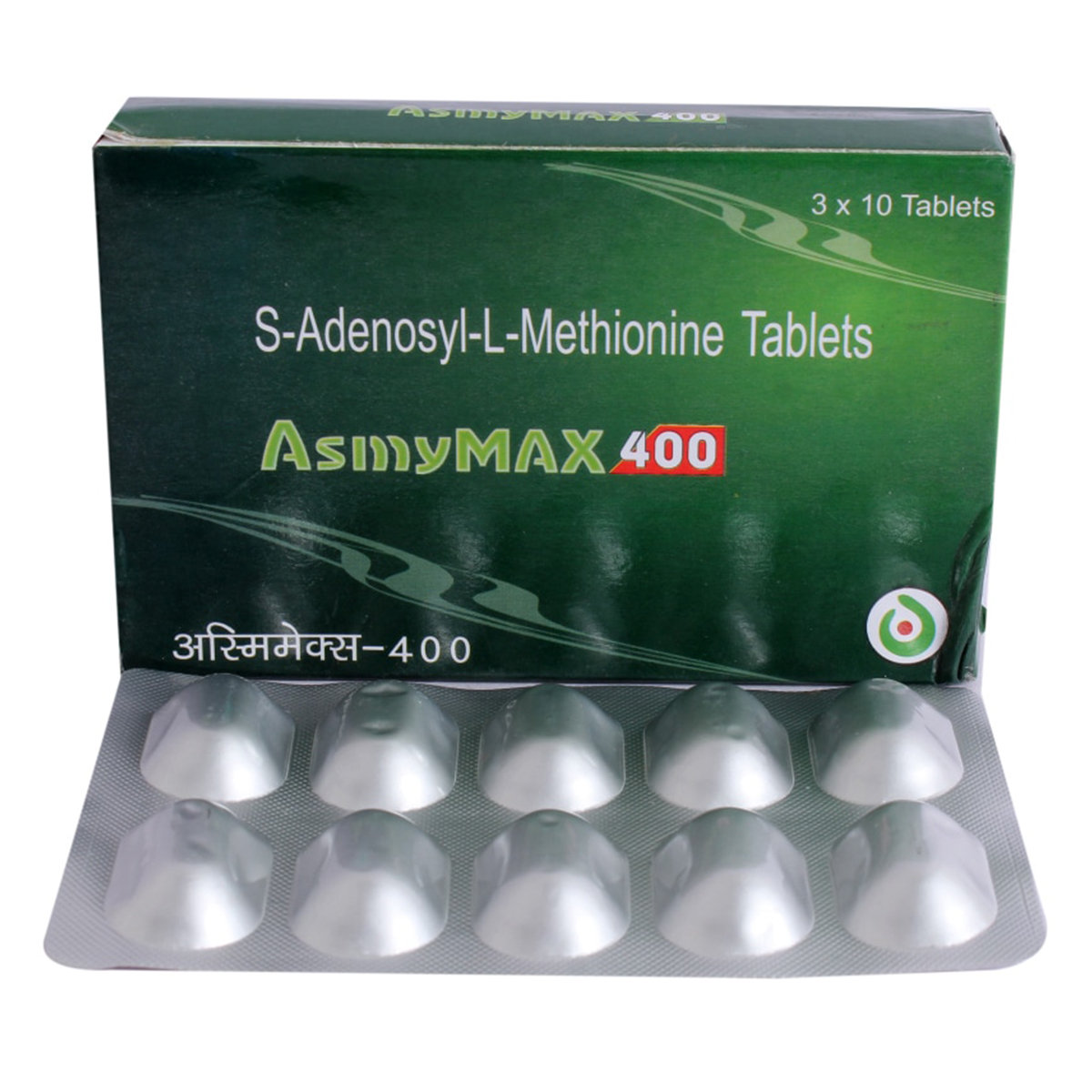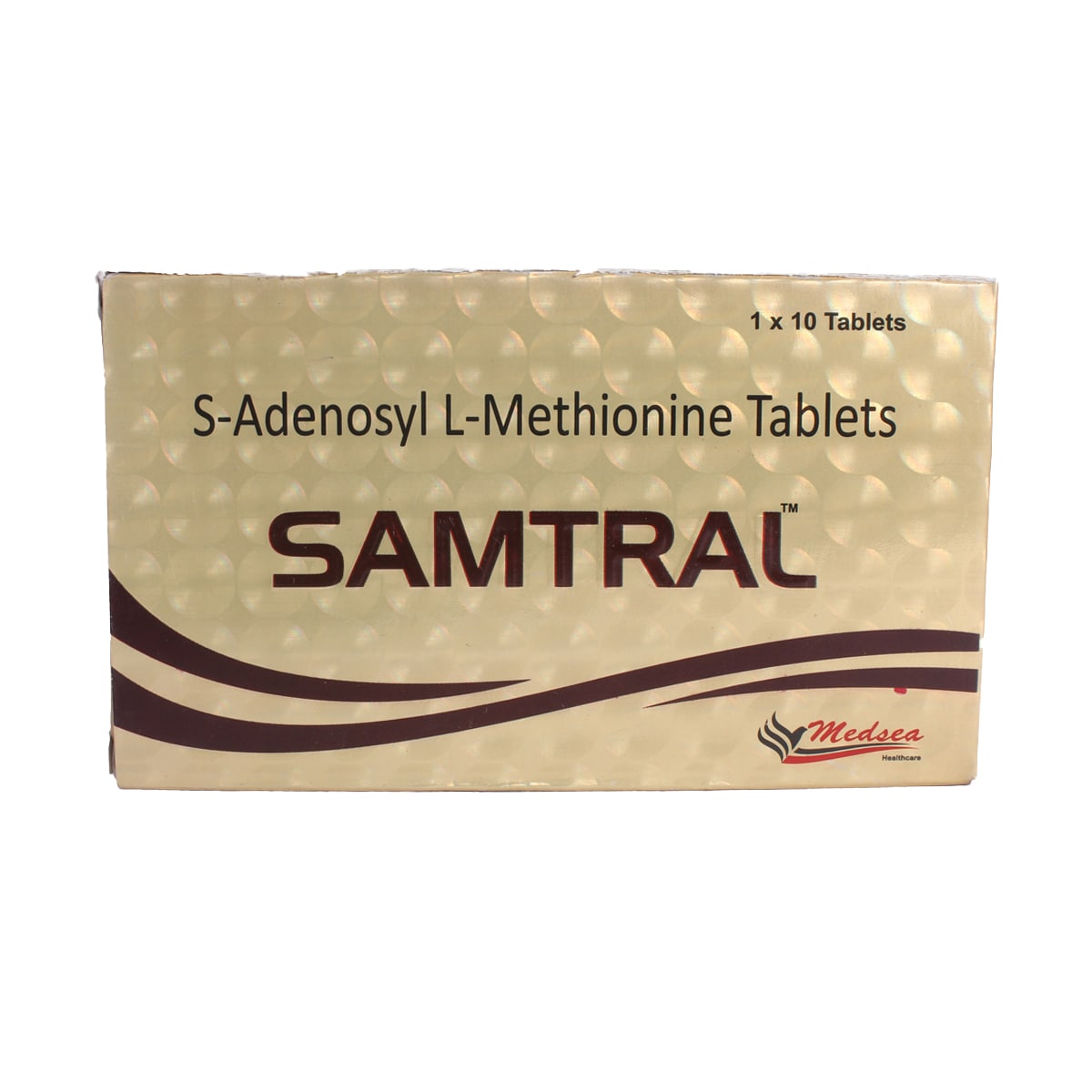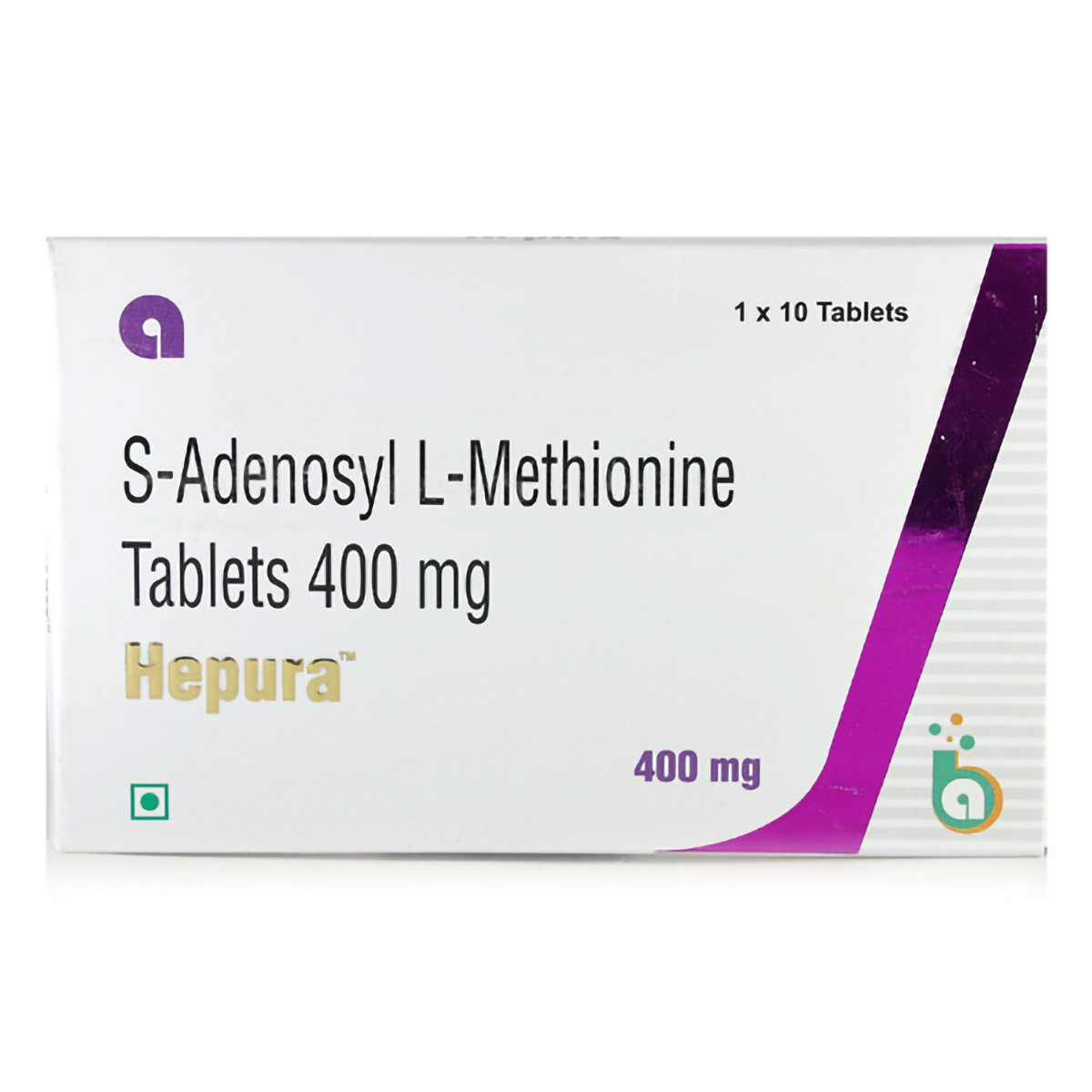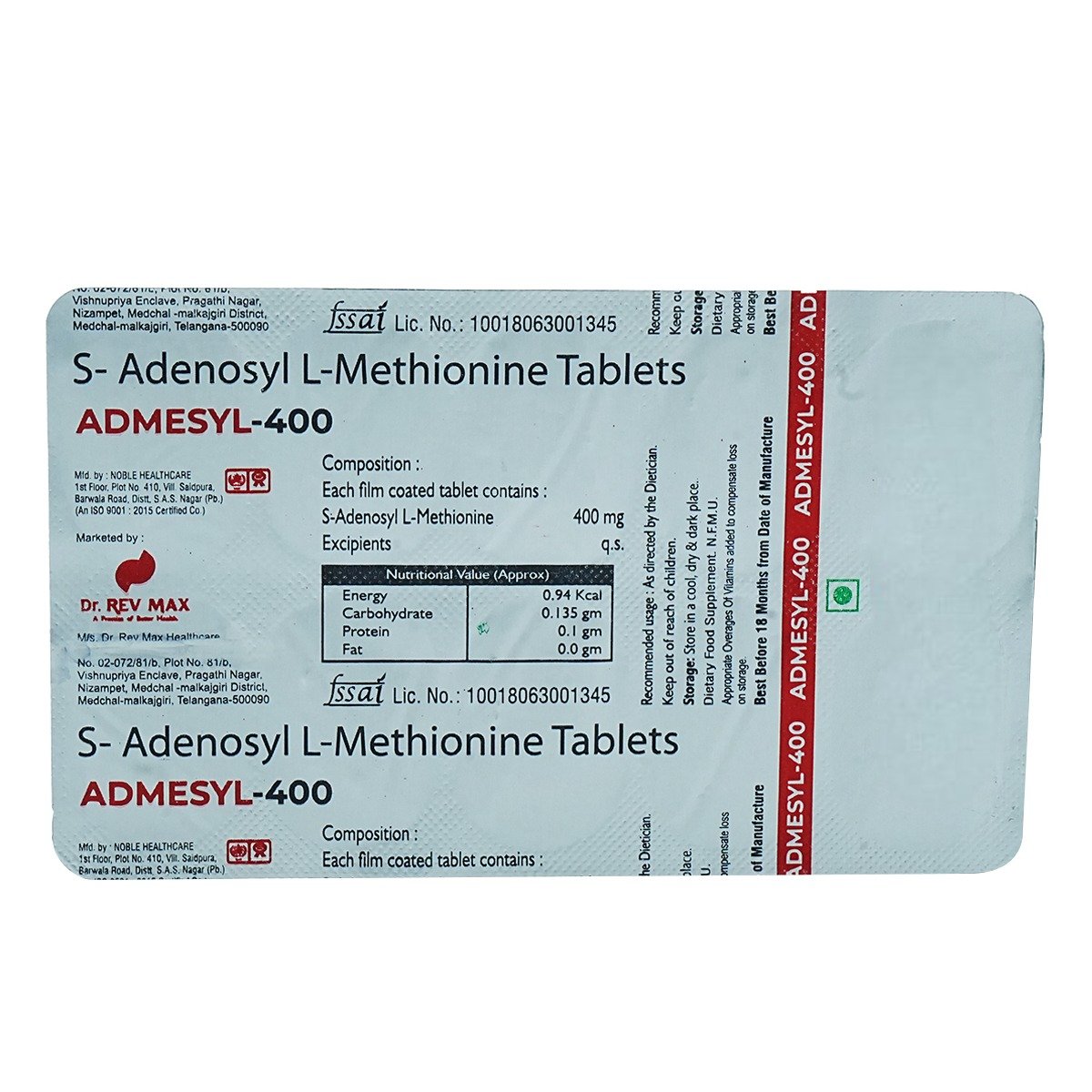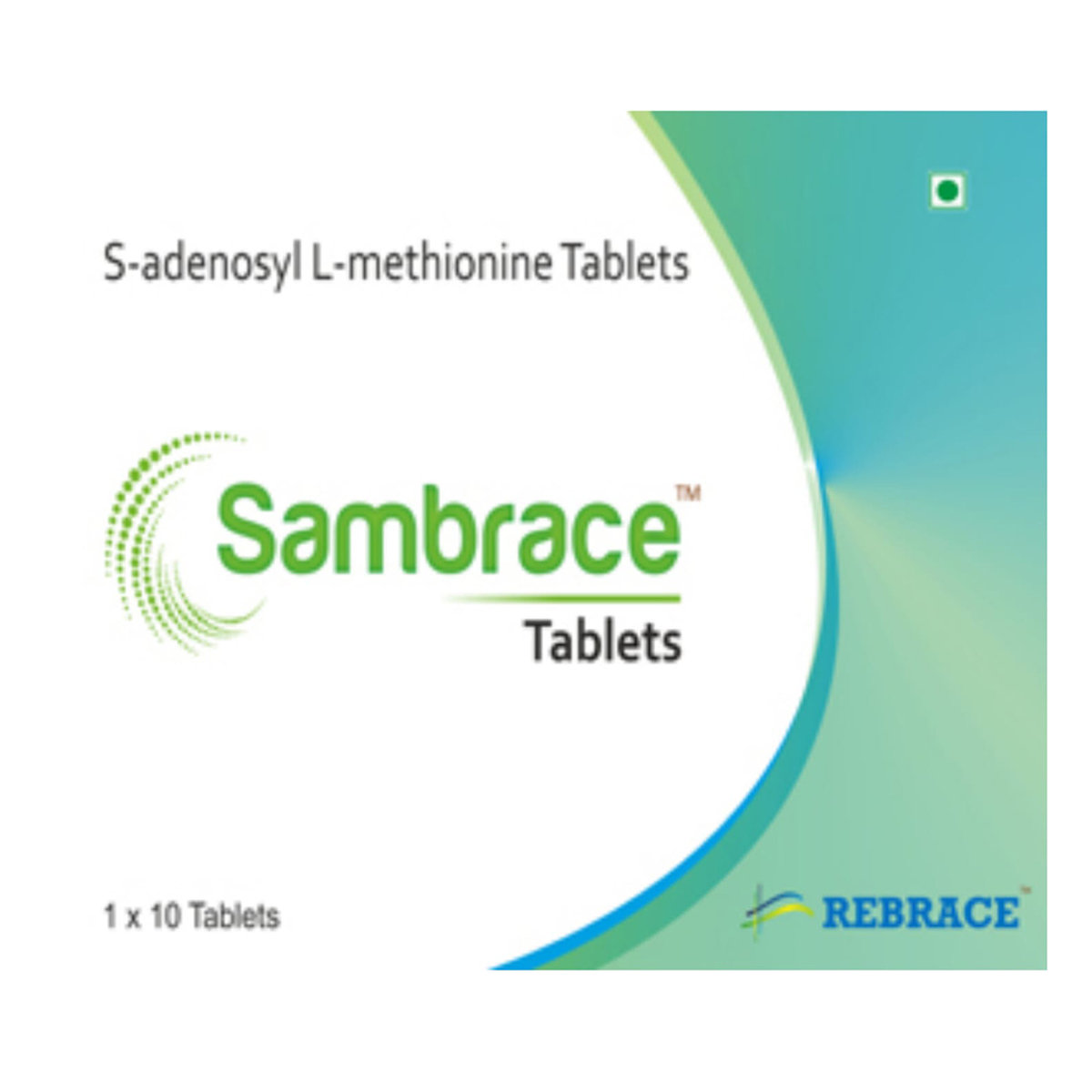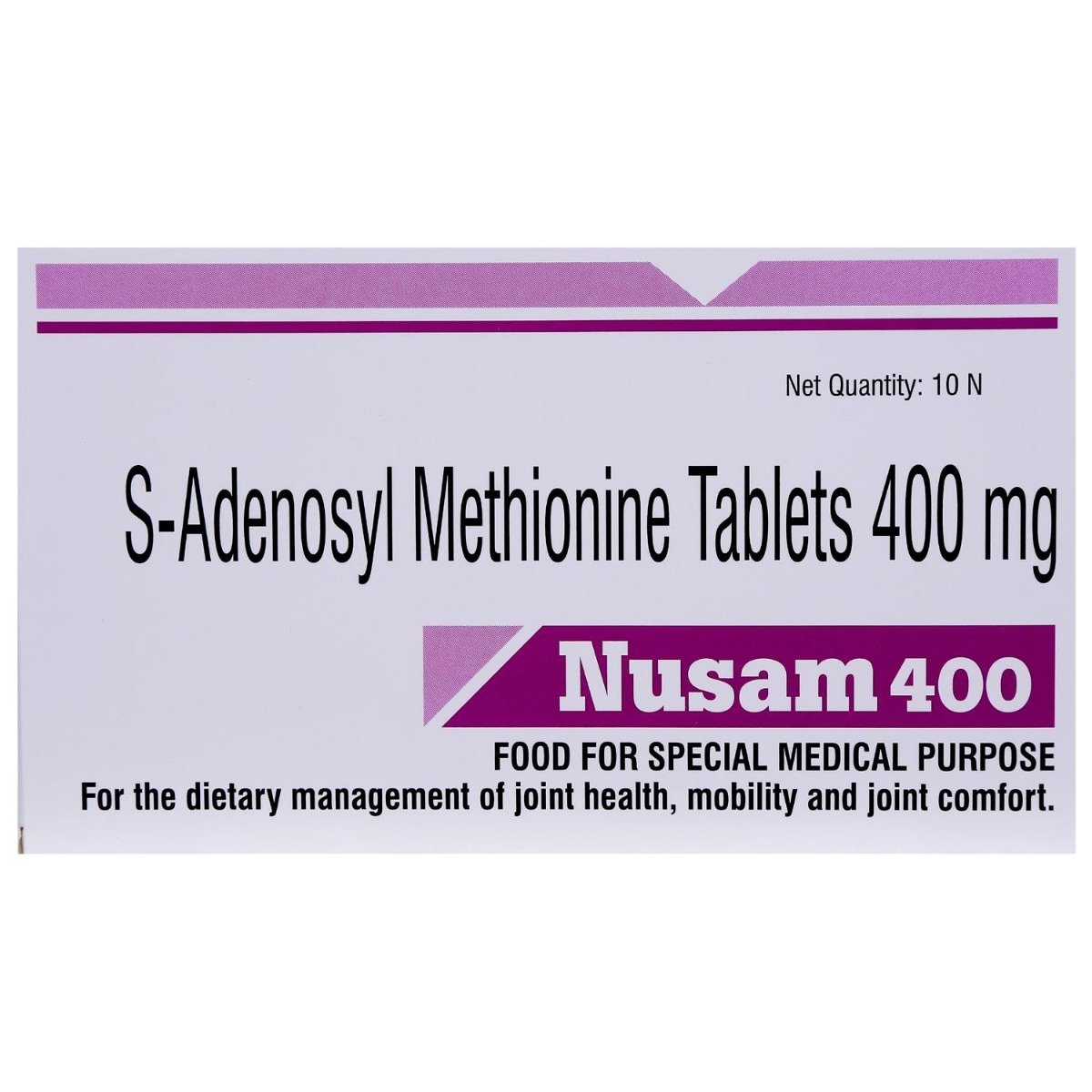Hepkart Tablet 10's
MRP ₹834
(Inclusive of all Taxes)
₹125.1 Cashback (15%)
Provide Delivery Location
Online payment accepted
 Prescription drug
Prescription drugWhats That
Composition :
Manufacturer/Marketer :
Consume Type :
Expires on or after :
Return Policy :
About Hepkart Tablet
Hepkart Tablet is used in the treatment of mild to moderate alcoholic liver disease, osteoarthritis, and depression. Alcoholic liver disease occurs due to liver damage because of excessive alcohol consumption. Osteoarthritis is a condition in which the joints are affected. Depression is a mood disorder and a psychological, physiological and emotional experience that affects the way we think, the things we do and the way we act.
Hepkart Tablet contains S-Adenosyl-L-Methionine, an essential amino acid required for optimal cellular functioning. Hepkart Tablet is believed to monitor and regulate important physiological functions in living cells. It increases glutathione concentration and metabolism of the liver. Hepkart Tablet increases chondrocyte proteoglycan synthesis, thereby helping treat osteoarthritis.
Hepkart Tablet may be taken with or without food, but it is better to take it at a designated time. Hepkart Tablet should be swallowed whole and not crushed or chewed. In some cases, Hepkart Tablet may cause certain common side effects such as nausea, diarrhoea, stomach pain, and flatulence. Most of these side effects do not require medical attention and will resolve gradually over time. However, you are advised to talk to your doctor if these side effects persist.
It is advisable to inform the doctor if you are allergic to any of the components of Hepkart Tablet . Consult your doctor if you are pregnant, planning to get pregnant, or breastfeeding. Exercise caution when taking Hepkart Tablet with any anti-Parkinsonian drugs or anti-depressants. It is not advisable to take alcohol with Hepkart Tablet as there may be an interaction. Discuss your entire surgical history with your treating doctor and keep them informed of any pending surgical procedure.
Uses of Hepkart Tablet
Directions for Use
Key Benefits
Hepkart Tablet contains S-Adenosyl-L-Methionine. Hepkart Tablet helps in the synthesis of essential amino acid methionine, which is required for major body functions. It helps provide cellular energy and charge the living cells of various organs like the brain, bones and liver with stamina and fuel, thereby finding application in the treatment of depression, arthritis and liver disease. It helps in major detoxification of the liver in case of diseases caused by a retarded flow of bile such as intrahepatic cholestasis. Hepkart Tablet may also find use in the treatment of fibromyalgia, chronic pain, attention deficit hyperkinetic disorder and Alzheimer’s disease. However, studies to understand the mechanism behind the same have been inconclusive.
Storage
- If you experience signs of skin allergies such as redness, itching, or irritation after taking medication, contact your doctor right away.
- To alleviate skin allergy symptoms, your doctor may change your medication regimen or offer tailored medication management advice.
- Your doctor may recommend or prescribe drugs to relieve discomfort.
- Cool compresses or calamine lotion can help relieve redness and itching on the afflicted skin area.
- Staying hydrated by consuming plenty of water can help relieve discomfort.
- Monitor your skin condition closely and promptly report any changes, worsening symptoms, or concerns to your healthcare provider.
- Contact your doctor immediately if you're experiencing a fast heart rate, palpitations, or other heart-related symptoms. This is crucial to determine whether the symptoms are related to your medication.
- Your doctor may need to adjust your medication regimen to alleviate the fast heart rate symptoms. This could involve changing the medication, reducing the dosage, or adding new medications to counteract the side effects.
- Follow your doctor's advice on monitoring your heart rate and blood pressure. This will help track any changes and ensure your heart rate returns normal.
- If you experience severe symptoms such as chest pain, dizziness, or shortness of breath, seek immediate medical attention. These symptoms can indicate a more serious condition that requires prompt treatment.
- Exercising regularly helps lower the risk of heart problems.
- Maintain a healthy diet, including vegetables and fruits.
- Rest well; get enough sleep.
- Manage stress with yoga and meditation.
- Limit alcohol and smoking.
- Swelling of the throat can worsen if there is no proper rest for your throat.
- Drink plenty of warm fluids and frequently gargle with salt water.
- Humidify the surrounding air using a humidifier, as dry air may increase dryness and throat pain.
- Talk to your doctor if the swelling bothers you while swallowing food.
- Take enough rest and stay in warm places to reduce pain quickly.
- Tell your doctor immediately if you experience shortness of breath after taking medication.
- Your doctor may adjust the medication regimen or dosage or give alternative medical procedures to minimize the symptoms of shortness of breath.
- Monitor your oxygen levels and breathing rate regularly to track changes and potential side effects.
- For controlling stress and anxiety, try relaxation techniques like deep breathing exercises, meditation, or yoga.
- Make lifestyle changes, such as quitting smoking, exercising regularly, and maintaining a healthy weight.
- Seek emergency medical attention if you experience severe shortness of breath, chest pain, or difficulty speaking.
- Follow up regularly with your doctor to monitor progress, adjust treatment plans, and address any concerns or questions.
- Talk to your doctor about your back pain and potential medication substitutes or dose changes.
- Try yoga or Pilates and other mild stretching exercises to increase flexibility and strengthen your back muscles.
- To lessen the tension on your back, sit and stand upright and maintain proper posture.
- To alleviate discomfort and minimize inflammation, apply heat or cold packs to the afflicted area.
- Under your doctor's supervision, think about taking over-the-counter painkillers like acetaminophen or ibuprofen.
- Make ergonomic adjustments to your workspace and daily activities to reduce strain on your back.
- To handle tension that could make back pain worse, try stress-reduction methods like deep breathing or meditation.
- Use pillows and a supportive mattress to keep your spine in the right posture as you sleep.
- Back discomfort can worsen by bending, twisting, and heavy lifting.
- Speak with a physical therapist to create a customized training regimen to increase back strength and flexibility.
- Inform your doctor about dizziness symptoms. They may adjust your medication regimen or prescribe additional medications to manage symptoms.
- Follow your doctor's instructions for taking medication, and take it at the same time every day to minimize dizziness.
- When standing up, do so slowly and carefully to avoid sudden dizziness.
- Avoid making sudden movements, such as turning or bending quickly, which can exacerbate dizziness.
- Drink plenty of water throughout the day to stay hydrated and help alleviate dizziness symptoms.
- If you're feeling dizzy, sit or lie down and rest until the dizziness passes.
- Track when dizziness occurs and any factors that may trigger it, and share this information with your doctor to help manage symptoms.
Drug Warnings
It is advisable to inform the doctor if you are allergic to any of the components of Hepkart Tablet . Keep your doctor informed of your entire medical history before using Hepkart Tablet . Consult your doctor if you are pregnant, planning to get pregnant, or breastfeeding. Exercise caution when taking Hepkart Tablet with any anti-Parkinsonian drugs or anti-depressants. It is not advisable to take Hepkart Tablet with alcohol as there may be an interaction. Discuss your entire surgical history with your treating doctor and keep them informed of any pending surgical procedure.
Drug-Drug Interactions
Drug-Drug Interactions
Login/Sign Up
Drug-Food Interactions
Drug-Food Interactions
Login/Sign Up
Diet & Lifestyle Advise
- Load up on lean meats, fatty fish, green leafy vegetables, fruits and nuts to enhance anti-oxidation and optimal functioning of the body.
- Drink a lot of water and keep yourself hydrated.
- Maintain a healthy weight by exercising for at least 30 minutes daily.
- Stop smoking as this can have a negative effect on the absorption of Hepkart Tablet and worsen the disease conditions.
Side Effects of Hepkart Tablet
- Nausea
- Diarrhoea
- Flatulence
- Stomach pain
Habit Forming
Therapeutic Class
All Substitutes & Brand Comparisons
RX
Sademet 400 Tablet 10's
Sparsh Remedies Pvt Ltd
₹488.5
(₹42.99 per unit)
42% CHEAPERRX
Out of StockNusig 400 mg Tablet 10's
Vanguard Therapeutics Pvt Ltd
₹480
(₹43.2 per unit)
42% CHEAPERRX
Admin-400 Tablet 10's
Sanatra Healthcare Ltd
₹506
(₹45.54 per unit)
39% CHEAPER
Drug-Diseases Interactions
Drug-Diseases Interactions
Login/Sign Up
FAQs
Drug-Drug Interactions Checker List
- LEVODOPA
- FLUOXETINE
- PAROXETINE
- RISPERIDONE
- OLANZAPINE
- CITALOPRAM
- ESCITALOPRAM
- MEPERIDINE
- TRAMADOL
- METHADONE
- SUMATRIPTAN
- ZOLMITRIPTAN
- SERTRALINE
Special Advise
Inform the doctor in case of any pending surgery or surgical procedure before taking Hepkart Tablet .
Disease/Condition Glossary
Liver disease: Liver disease is a condition in which the liver does not function properly. Symptoms include severe skin itching, nausea, loss of appetite, jaundice, dark urine or stools etc.
Osteoarthritis: Osteoarthritis is the most common type of arthritis. It occurs due to the breakdown of cartilage that cushions and protects the bones. The disease progresses gradually and tends to worsen if not treated. Symptoms include joint pain in the hips, lower back, knees and hands.
Depression: Depression is a psychological, physiological and emotional experience that affects the way we think, the things we do and the way we act. Losing interest in activities you once enjoyed, loss of appetite, feelings of guilt, low mood, low self-esteem and low energy levels are some symptoms of depression.

Have a query?
Alcohol
Safe if prescribed
It is not known whether it is safe to consume alcohol with Hepkart Tablet . Please consult your doctor if you have any concerns.
Pregnancy
Consult your doctor
Hepkart Tablet should be used with caution in pregnant women. Please consult a doctor if you are pregnant.
Breast Feeding
Consult your doctor
Hepkart Tablet should be used with caution in nursing mothers. Please consult a doctor.
Driving
Safe if prescribed
Hepkart Tablet may rarely cause drowsiness and dizziness. Exercise caution while driving in case of these side effects.
Liver
Consult your doctor
Hepkart Tablet is possibly safe on the liver. Please consult your doctor in case of any concerns.
Kidney
Consult your doctor
Hepkart Tablet is possibly safe on the kidney. Please consult your doctor in case of any concerns.
Children
Safe if prescribed
It is not established if Hepkart Tablet is safe to use in children. Please consult the treating doctor in case of any concerns.
Recommended for a 30-day course: 3 Strips

